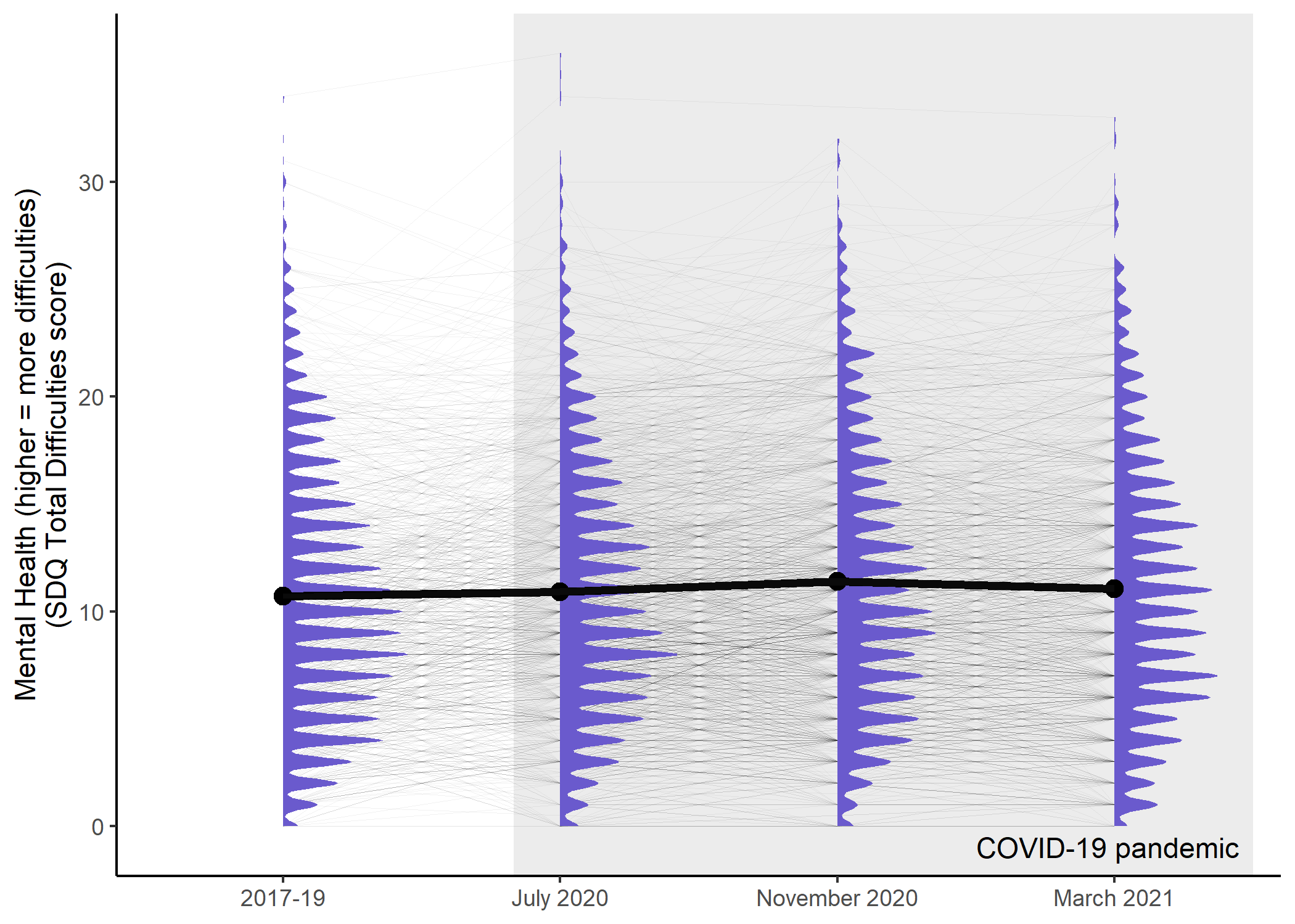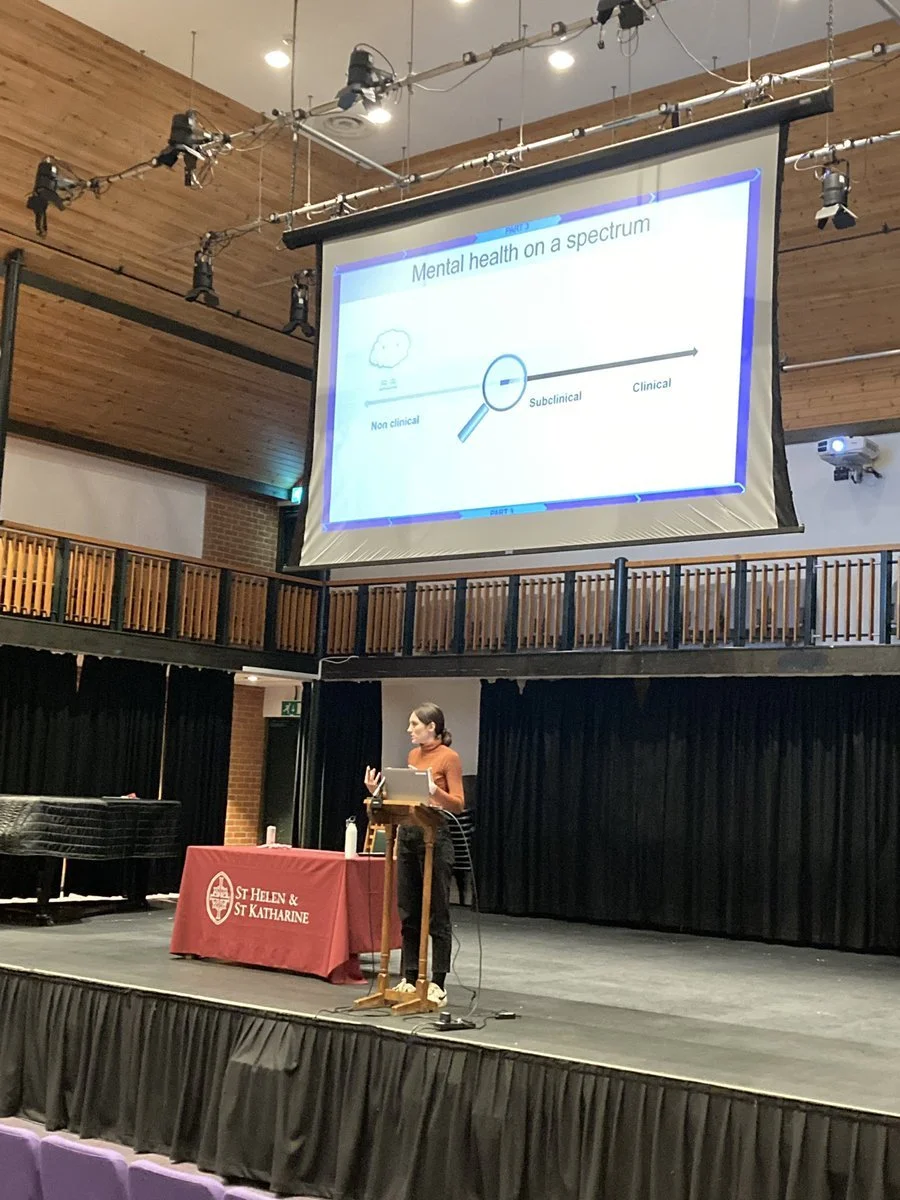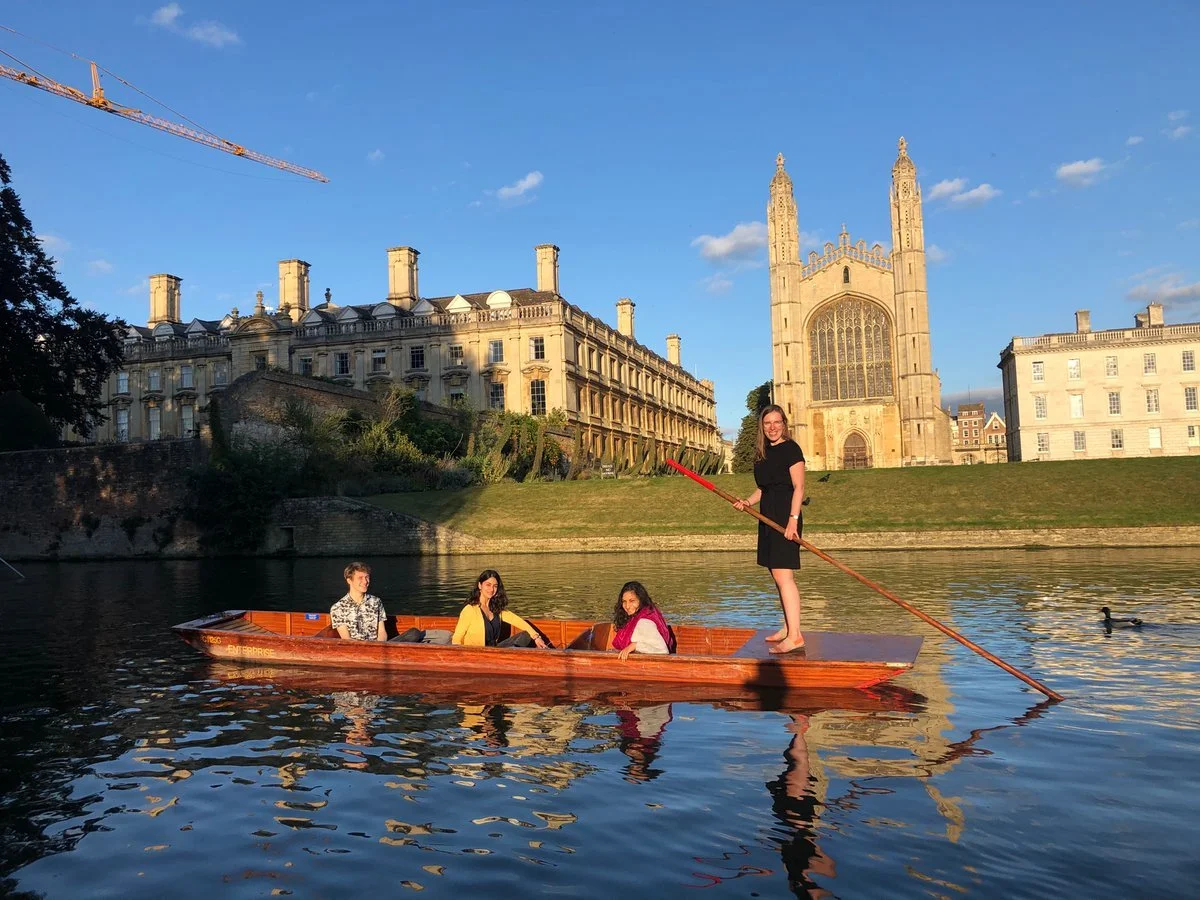
Research & Publications
-

Open Science
Our research aspires to be of the highest scientific standards and applies a variety of Open Science approaches. We actively encourage work that aims to improve research practices and methods.
-

Inclusive Science
We care deeply about doing science that helps people, locally or around the world. This extends beyond studying diverse populations, to studying research questions that diverse populations care about.
-

Team Science
We work together as a group and care about creating a collaborative, inclusive and creative environment, here at Cambridge and with our collaborators both nationally and internationally.
List of Publications
Preprints
Yap, V., Skeggs, A., Ferguson, A., Leyland-Craggs, A., Boeschoten, L., Welbers, K., Kurten, S., & Orben, A. (2024). Digital data donation with adolescents. https://osf.io/preprints/psyarxiv/hnvpy
Turner, G., Gunschera, L. J., Subrahmanya, S., Salecha, A., Eichstaedt, J. C., Palminteri, S.*, & Orben, A.* (2024). A computational model of reward learning and habits on social media. https://osf.io/preprints/psyarxiv/xe25k
Davidson, B., Turner, G., Tomova, L., Palminteri, S., Eichstaedt, J.C., Salecha, A., Subrahmanya, S., Gunschera, L. J.*, & Orben, A.* (2025). Social Isolation is Associated with Increased Behavioural Sensitivity to ‘Likes’ on Social Media. PsyArXiv. https://doi.org/10.31234/osf.io/65tdz_v1.
Gunschera, L.J., Achterberg, M., Speyer, L.G., Wise, T., Orben, A. Cognitive phenotypes of risk and resilience for the relationship between social media and mental health. (2025). PsyArXiv. https://osf.io/preprints/psyarxiv/bgqyj_v1.
Skeggs, A., Mehta, A., Katiyar, T., Yap, V., Burn, A.M., Slovak, P.*, Orben, A*. Youth Perspectives on Social Media Harms: A Large-Scale Micro-Narrative Study. (2025). PsyArXiv. https://osf.io/m38u6_v2/
Publications
2025
Skeggs, A., & Orben, A. (2025). Social media interventions to improve well-being. Nature Human Behaviour. https://doi.org/10.1038/s41562-025-02167-9
Turner, G., Ferguson, A. M., Katiyar, T., Palminteri, S., & Orben, A. (2025). Old strategies, new environments: Reinforcement Learning on social media. Biological Psychiatry. https://doi.org/10.1016/j.biopsych.2024.12.012.
Fassi, L., Ferguson, A.M., Przybylski, A.K., Ford, T.J., Orben, A. (2025). Social media use in adolescents with and without mental health conditions. Nature Human Behaviour. https://doi.org/10.1038/s41562-025-02134-4.
Orben, A., Matias, N.J. (2025). Fixing the science of digital technology harms. Science. DOI: 10.1126/science.adt6807
Kurten, S., Ghai, S., Odgers, C., Kievit, R., & Orben, A. (2025). Deprivation’s role in adolescent social media use and its links to life satisfaction. Computers in Human Behaviour. https://doi.org/10.1016/j.chb.2024.108541
Katiyar, T., Hunt, A., Orben, A., Chaudhary, N., Jaeggi, A. (2025). Digital Technologies & Evolutionary Mismatch: Harming, but Also Healing Mental Health. Psychological Review. https://doi.org/10.17863/CAM.122049
2024
Fassi, L., Thomas, K., Parry, D. A., Leyland-Craggs, A., Ford, T., & Orben, A. (2024). Social media use and internalising symptoms in clinical and community adolescent samples: A systematic review and meta-analysis. JAMA Paediatrics. https://jamanetwork.com/journals/jamapediatrics/fullarticle/2819781?guestaccesskey=3b8a9f61-3bde-4514-a250-d804b006ca4d
Orben, A., Meier, A., Dalgleish, T., & Blakemore, S. J. (2024). Mechanisms linking social media use to adolescent mental health vulnerability. Nature Reviews Psychology, 1-17. https://www.nature.com/articles/s44159-024-00307-y
Ferguson, A., Turner, G., & Orben, A. (2024). Social uncertainty in the digital world. Trends in Cognitive Sciences. https://doi.org/10.1016/j.tics.2024.02.005
Miller, J., Mills, K. L., Vuorre, M., Orben, A., & Przybylski, A. K. (2024). Impact of digital screen media activity on functional brain organization in late childhood: evidence from the ABCD study. Cortex, 169, 290-308. https://doi.org/10.1016/j.cortex.2023.09.009
2023
David, C., De Gelder, B., Caldarelli, G., de Rosnay, M.D., Casilli, A.A., Delanoë, A., Fassi, L., Frau-Meigs, D., Jouve, B., Nowak, A., Rodríguez-Doncel, V., […] Orben, A., […] , 2023. Toward a Research Agenda on Digital Media and Humanity Well-Being. CNRS. https://hal.science/hal-04091733/
Piera Pi‐Sunyer, B., Andrews, J. L., Orben, A., Speyer, L. G., & Blakemore, S. J. (2023). The relationship between perceived income inequality, adverse mental health and interpersonal difficulties in UK adolescents. Journal of child psychology and psychiatry, 64(3), 417-425. https://acamh.onlinelibrary.wiley.com/doi/full/10.1111/jcpp.13719
Orben, A., & Blakemore, S. J. (2023). How social media affects teen mental health: A missing link. Nature, 614(7948), 410-412. https://www.nature.com/articles/d41586-023-00402-9
Lamberton, C., Wein, T., & Ghai, S. (2023). From What to How: Dignity, Human Rights, and the Sustainable Development Goals. Human Rights, and the Sustainable Development Goals. https://papers.ssrn.com/sol3/papers.cfm?abstract_id=4380622
Ghai, S., de-Wit, L., & Mak, Y. (2023). How we investigated the diversity of our undergraduate curriculum. Nature. https://europepmc.org/article/med/36859679
Livingstone, S., Orben, A., & Odgers, C. (2023). Debate: Should academics collaborate with digital companies to improve young people's mental health?. Child and Adolescent Mental Health, 28(1), 150-152. https://acamh.onlinelibrary.wiley.com/doi/full/10.1111/camh.12630
McCrosky, J. D., Parry, D. A., Sewall, C. J., & Orben, A. (2023). Using Browser Data to Understand Desires to Spend Time Online. https://assets.pubpub.org/rfdjthbg/51678401203465.pdf
2022
Metherell, T. E., Ghai, S., McCormick, E. M., Ford, T. J., & Orben, A. (2022). Digital access constraints predict worse mental health among adolescents during COVID-19. Scientific Reports, 12(1), 19088. https://www.nature.com/articles/s41598-022-23899-y
Orben, A., Lucas, R. E., Fuhrmann, D., & Kievit, R. A. (2022). Trajectories of adolescent life satisfaction. Royal Society open science, 9(8), 211808. https://royalsocietypublishing.org/doi/full/10.1098/rsos.211808
Minihan, S., Orben, A., Songco, A., Fox, E., Ladouceur, C. D., Mewton, L., ... & Schweizer, S. (2022). Social determinants of mental health during a year of the COVID-19 pandemic. Development and Psychopathology, 1-13. https://www.cambridge.org/core/journals/development-and-psychopathology/article/social-determinants-of-mental-health-during-a-year-of-the-covid19-pandemic/4489DFD61F88A0400D21DAA6CDA40085
Kievit, R. A., McCormick, E. M., Fuhrmann, D., Deserno, M. K., & Orben, A. (2022). Using large, publicly available data sets to study adolescent development: opportunities and challenges. Current Opinion in Psychology, 44, 303-308. https://www.sciencedirect.com/science/article/pii/S2352250X21001950
Orben, A., Przybylski, A. K., Blakemore, S. J., & Kievit, R. A. (2022). Windows of developmental sensitivity to social media. Nature Communications, 13(1), 1649. https://www.nature.com/articles/s41467-022-29296-3
Ghai, S., Magis-Weinberg, L., Stoilova, M., Livingstone, S., & Orben, A. (2022). Social media and adolescent well-being in the Global South. Current Opinion in Psychology, 101318. https://www.sciencedirect.com/science/article/pii/S2352250X22000288
Modecki, K. L., Goldberg, R. E., Wisniewski, P., & Orben, A. (2022). What is digital parenting? A systematic review of past measurement and blueprint for the future. Perspectives on Psychological Science, 17(6), 1673-1691. https://journals.sagepub.com/doi/pdf/10.1177/17456916211072458
Orben, A. (2022). Digital diet: A 21st century approach to understanding digital technologies and development. Infant and Child Development, 31(1), e2228. https://onlinelibrary.wiley.com/doi/abs/10.1002/icd.2228
Ghai, S. (2022). The diversity–innovation paradox. Nature Reviews Psychology, 1(2), 66-66. https://www.nature.com/articles/s44159-021-00009-9
Ghai, S. (2022). Expand diversity definitions beyond their Western perspective. Nature, 602(7896), 211-211. https://ideas.repec.org/a/nat/nature/v602y2022i7896d10.1038_d41586-022-00330-0.html
2021
Ghai, S., Fassi, L., Awadh, F., & Orben, A. (2021). Lack of sample diversity in research on adolescent depression and social media use: a scoping review and meta-analysis. Clinical Psychological Science. https://journals.sagepub.com/doi/pdf/10.1177/21677026221114859
Vuorre, M., Orben, A., & Przybylski, A. K. (2021). There is no evidence that associations between adolescents’ digital technology engagement and mental health problems have increased. Clinical Psychological Science, 9(5), 823-835. https://journals.sagepub.com/doi/pdf/10.1177/2167702621994549
Ghai, S. (2021). Getting personal. Science, 374(6565), 366-366. https://www.science.org/doi/pdf/10.1126/science.acx9301
Ghai, S. (2021). It’s time to reimagine sample diversity and retire the WEIRD dichotomy. Nature Human Behaviour, 5(8), 971-972. https://www.nature.com/articles/s41562-021-01175-9
2020
Przybylski, A. K., Orben, A., & Weinstein, N. (2020). How much is too much? Examining the relationship between digital screen engagement and psychosocial functioning in a confirmatory cohort study. Journal of the American Academy of Child & Adolescent Psychiatry, 59(9), 1080-1088. https://www.sciencedirect.com/science/article/pii/S0890856719314376
Orben, A., Tomova, L., & Blakemore, S. J. (2020). The effects of social deprivation on adolescent development and mental health. The Lancet Child & Adolescent Health, 4(8), 634-640. https://www.sciencedirect.com/science/article/pii/S2352464220301863
Orben, A., Weinstein, N., & Przybylski, A. K. (2020). Only holistic and iterative change will fix digital technology research. Psychological Inquiry, 31(3), 235-241. https://www.tandfonline.com/doi/full/10.1080/1047840X.2020.1820221
Orben, A. (2020). The Sisyphean cycle of technology panics. Perspectives on Psychological Science, 15(5), 1143-1157. https://journals.sagepub.com/doi/pdf/10.1177/1745691620919372
Orben, A., & Przybylski, A. K. (2020). Reply to: Underestimating digital media harm. Nature Human Behaviour, 4(4), 349-351. https://www.nature.com/articles/s41562-020-0840-y
Orben, A. (2020). Teenagers, screens and social media: a narrative review of reviews and key studies. Social psychiatry and psychiatric epidemiology, 55(4), 407-414. https://link.springer.com/article/10.1007/s00127-019-01825-4?wt_mc=Internal.Event.1.SEM.ArticleAuthorOnlineFirst&utm_source=ArticleAuthorOnlineFirst&utm_medium=email&utm_content=AA_en_06082018&ArticleAuthorOnlineFirst_20200111?utm_source=modulosPL&utm_medium=linkinterno&utm_campaign=ux
Orben, A., & Przybylski, A. K. (2020). Teenage sleep and technology engagement across the week. PeerJ, 8, e8427. https://peerj.com/articles/8427/
K. Kaye, L., Orben, A., A. Ellis, D., C. Hunter, S., & Houghton, S. (2020). The conceptual and methodological mayhem of “screen time”. International Journal of Environmental Research and Public Health, 17(10), 3661. https://www.mdpi.com/1660-4601/17/10/3661
Orben, A., & Lakens, D. (2020). Crud (re) defined. Advances in Methods and Practices in Psychological Science, 3(2), 238-247. https://journals.sagepub.com/doi/pdf/10.1177/2515245920917961
2019
Orben, A. (2019). A journal club to fix science. Nature, 573(7775), 465-466. https://go.gale.com/ps/i.do?id=GALE%7CA600698972&sid=googleScholar&v=2.1&it=r&linkaccess=abs&issn=00280836&p=HRCA&sw=w
Orben, A., Dienlin, T., & Przybylski, A. K. (2019). Reply to Foster and Jackson: Open scientific practices are the way forward for social media effects research. Proceedings of the National Academy of Sciences, 116(31), 15334-15335. https://www.pnas.org/doi/abs/10.1073/pnas.1909553116
Orben, A., Dienlin, T., & Przybylski, A. K. (2019). Social media’s enduring effect on adolescent life satisfaction. Proceedings of the National Academy of Sciences, 116(21), 10226-10228. https://www.pnas.org/doi/abs/10.1073/pnas.1902058116
Orben, A., & Przybylski, A. K. (2019). The association between adolescent well-being and digital technology use. Nature human behaviour, 3(2), 173-182. https://www.nature.com/articles/s41562%20018%200506%201
Orben, A., & Przybylski, A. K. (2019). Screens, teens, and psychological well-being: Evidence from three time-use-diary studies. Psychological science, 30(5), 682-696. https://journals.sagepub.com/doi/pdf/10.1177/0956797619830329
2018
Orben, A., Mutak, A., Dablander, F., Hecht, M., Krawiec, J. M., Valkovičová, N., & Kosīte, D. (2018). From face-to-face to Facebook: Probing the effects of passive consumption on interpersonal attraction. Frontiers in Psychology, 9, 1163. https://www.frontiersin.org/articles/10.3389/fpsyg.2018.01163/full
2017
Orben, A. C., & Dunbar, R. I. (2017). Social media and relationship development: The effect of valence and intimacy of posts. Computers in Human Behavior, 73, 489-498. https://www.sciencedirect.com/science/article/abs/pii/S0747563217302364